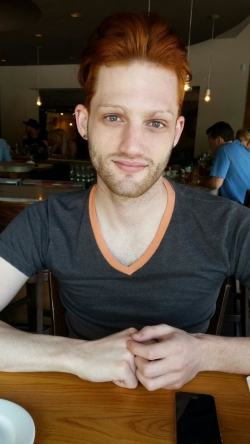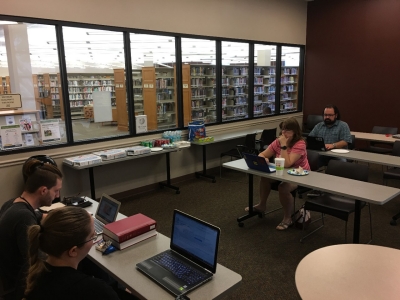Librarians Who Wikipedia: Paul Flagg, Tampa-Hillsborough County Public Library
Wikipedia + Libraries: Better Together is an OCLC project that is building bridges between public libraries and Wikipedia; featuring an online training program for US public library staff hosted by WebJunction in the fall of 2017. Librarians Who Wikipedia is a series of interviews with library staff who engage with Wikipedia.

Paul Flagg became a part of the Wikipedia
community during his master’s degree program at
the University of South Florida. Credit: Courtesy
Paul Flagg.
Paul Flagg began editing Wikipedia last year during his MLIS studies at the University of South Florida. Currently a staff member at Tampa-Hillsborough County Public Library, Flagg edits articles on a range of topics and has organized Wikipedia events at his library system. We spoke with him about why Wikipedia is important for public librarianship in a digital age.
How did you start to edit?
I took courses with Dr. Kathleen de la Peña McCook during my master’s degree program at USF. She incorporates Wikipedia into all of her teaching. We learned how Wikipedia is built, how it is edited and what goes into making it so easily accessible. In her Libraries as Cultural Heritage Institutions class, we edited Wikipedia articles about these institutions and increased their visibility online.
What are your thoughts on Wikipedia as a cultural heritage institution?
Thanks for asking that question. Wikipedia can definitely be understood as a 21st-century cultural heritage institution. It's a digital information repository that seeks to make knowledge more easily accessible. Because Wikipedia is a collaborative project that relies mostly on volunteers, it works through collaboration, teamwork and goodwill. So does Wikipedia’s automatic and transparent archiving of changes made and page histories. This kind of digital preservation strengthens Wikipedia's work as a digital cultural heritage institution.
However, to be representative of the rich cultural heritages of the world, there’s more to be done to expand Wikipedia. The ability for Wikipedia editors to contribute anonymously works in favor of this ideal.
What do you edit?
I focus my editing on improving Wikipedia’s coverage of women authors and writers. There are many notable female authors who don’t have articles but should. Improving Wikipedia’s coverage of social diversity is important; when people of differing perspectives gather sources and contribute, this increases the range of representations in society.
How have you used Wikipedia for outreach?
Although Wikipedia engagement isn’t an official part of my role, I collaborated with fellow members of the Student Organizations for Library & Information Science (SOLIS) at the University of South Florida to organize two editing events at public libraries in the county. We focused on editing and adding content to Wikipedia, keeping in mind the themes of human rights, social justice, equality and diversity. For our events, rooms were free and we received a grant through the Wikimedia Foundation to pay for the room cleaning fee and refreshments.

In 2017, Paul Flagg co-organized a WikiEquality editing event with colleagues
from graduate school at the library system where he works. Credit: Courtesy
Emilie Ashby
How did your events go?
It was an eye-opening process! People often need coaching on what it means to contribute to a tertiary source. Wikipedia is not Blogspot! Our successes were in adding references. There needs to be a place for Wikipedia in the library–for events like these and for people seeking reference information. Librarians can edit and guide people who are struggling with research to go to Wikipedia for that baseline information.
What message would you like to share with public library staff?
As librarians, it is our job to connect library users with the information that they seek; searching for basic information using complicated online databases can be tedious or difficult for many library users. Wikipedia is a much more user-friendly resource for the everyday individual to consult for general information inquiries. Furthermore, by contributing to an information resource as useful and as extensive as Wikipedia, librarians can help to make it more reliable whether by editing for clarity, adding citations, or ensuring that a wide variety of content is available.
